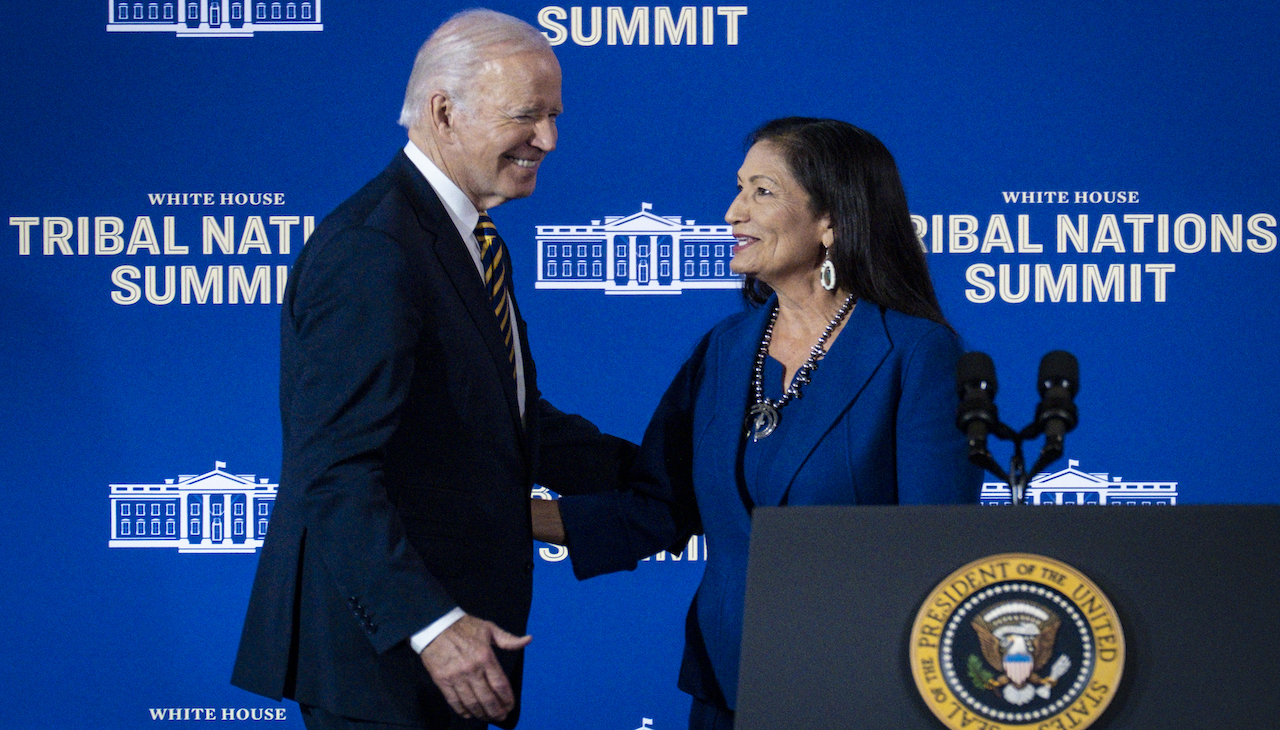
Biden announces major funding to help tribes cope with climate change
The President revealed the efforts at the first in-person Tribal Nations Summit in over six years on Nov. 30.
At the first in-person Tribal Nations Summit in over six years on Wednesday, Nov. 30, President Joe Biden announced huge funding, and other commitments towards the Native American community and tribes. One of which is that the Government will award three Native tribes each $25 million — $75 million total — to seek new shelter amid ongoing threats from climate change.
The two Alaska and one Washington State tribes will each get $25 million to move their important buildings away from the rising water levels and onto higher ground and homes will also follow. Additionally, the federal government will award eight other tribes $5 million each for relocation.
Some of these tribes include the Chitimacha Tribe, in Louisiana; the Yurok Tribe, in Northern California; and others in Alaska.
This is one of the U.S.’s biggest efforts to relocate communities that are facing an imminent threat because of climate change that could destroy their homes, and livelihood.
“It gave me goosebumps when I found out we got that money,” said Joseph John Jr., a council member in Newtok, a village in southwest Alaska where the land is quickly eroding. It will receive $25 million to relocate inland. “It will mean a lot to us.”
Some of the other tribes to receive $25 million were Napakiak, a village located by the banks of the Kuskokwim River that due to erosion, is losing 25 to 50 feet of land a year, and the Quinault Indian Nation, on Washington State’s Olympic Peninsula, whose main town, Taholah, faces flooding.
The relocation funding is all part of a project by the U.S. Interior Department. Furthermore, it is a federal government acceptance that more places, not just around the U.S., but around the world, cannot be protected against consequences of climate change. Officials close to the matter said they hope the huge spending will allow for the federal government to help other communities facing the same issues.
For the tribes receiving the funds, according to officials, there was no lengthy application process. Rather, the Bureau of Indian Affairs looked at tribes and communities that had begun their own semblance of planning for relocation and applied five criteria, such as the amount of risk they currently face, whether they had selected new sites to move to and their readiness to do so.
The relocation of entire communities of people is one of many ways to cope or adapt to climate change, and is costly. Even with the high upfront costs, it’s a good investment in the long run as it will help reduce total costs of damage from any future disasters, and rebuilding costs after the fact.
RELATED CONTENT
Relocation is costly and can also be quite troublesome in some aspects. Back in 2016, under the Obama administration, they awarded Louisiana $48 million to relocate the small coastal village of Isle de Jean Charles. The village in the time since, has lost most of its land to the rising waters in the Gulf of Mexico. And residents disagreed on where the new site of the village should be. It took a while, and it was just this year that people began moving into their new homes.
Furthermore, sometimes with commitments and efforts such as those aforementioned, it can also cause controversy as the question of who to help first is brought up. Earlier this year, the Bureau of Indian Affairs allowed for tribal nations to apply for up to $3 million in relocation money, as part of a contest.
Eleven tribes applied with only five receiving funding. To make it even more controversial, the bureau declined to comment on how exactly it had decided which tribes to help.
Assistant Secretary for Indian affairs at the Interior Department Bryan Newland, told the New York Times that the federal government needs to figure out how to help with the relocation of tribes and communities that actually are looking to move.
The announcements made today by the president will be an opportunity for the Bureau of Indian Affairs to learn and better coordinate its relocation strategies with other agencies that work on disaster recovery, including the Federal Emergency Management Agency.
Other new commitments and efforts that Biden outlined at the Summit were uniform standards for federal agencies to discuss with tribes, a plan to revitalize Native languages as well as bolster tribal rights that are listed in existing treaties with the U.S. government.
The Biden administration also announced that the Commerce Department will work with tribes to help them oversee resources like water and fisheries. The Agriculture Department and the Interior Department have also signed 20 co-stewardship agreements with tribes, and an additional 60 are currently still under review, the administration said.
“On my watch, we’re ushering in a new era,” Biden said in his remarks.











LEAVE A COMMENT:
Join the discussion! Leave a comment.